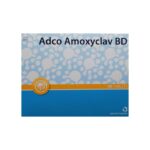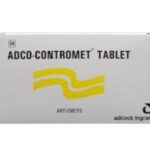Adco-Salterpyn Syrup: Uses, Side Effects, Addiction

Adco-Salterpyn syrup is an analgesic and antipyretic medication containing codeine, promethazine and acetaminophen. The combination of acetaminophen and codeine is used to relieve mild to moderate pain. Acetaminophen is in a class of medications called analgesics (pain relievers) and antipyretics (fever reducers). It works by changing the way the body senses pain and by cooling the body. Codeine belongs to a class of medications called opiate (narcotic) analgesics and to a class of medications called antitussives. When codeine is used to treat pain, it works by changing the way the brain and nervous system respond to pain. When codeine is used to reduce coughing, it works by decreasing the activity in the part of the brain that causes coughing.
Promethazine is used with other medications to help relieve pain. Adco-Salterpyn syrup is used for the temporary relief of acute moderate pain when Paracetamol alone is not sufficient and sedation is considered beneficial in patients over the age of 12 years. In addition, review of several decades of adverse event reports submitted to FDA from January 1969 to May 2015 identified 64 cases of serious breathing problems, including 24 deaths, with codeine-containing medicines in children younger than 18 years.
Is Adco-Salterpyn syrup addictive?
Yes, Adco-Salterpyn syrup contains codeine phosphate. When used for a long time, it may become habit-forming, causing mental or physical dependence. However, people who have continuing pain should not let the fear of dependence keep them from using narcotics to relieve their pain. Mental dependence (addiction) is not likely to occur when narcotics are used for this purpose. Physical dependence may lead to withdrawal side effects if treatment is stopped suddenly. However, severe withdrawal side effects can usually be prevented by gradually reducing the dose over a period of time before treatment is stopped completely.
How should I take Adco-Salterpyn syrup?
Follow the directions on your prescription label and read all medication guides. Never use Adco-Salterpyn syrup in larger amounts, or for longer than prescribed. Take this medicine only until your symptoms clear up. Never share opioid medicine with another person, especially someone with a history of drug abuse or addiction. Misuse can cause addiction, overdose, or death. Keep the medication in a place where others cannot get to it. Selling or giving away opioid medicine is against the law.
Measure Adco-Salterpyn syrup carefully. Use the dosing syringe provided, or use a medicine dose-measuring device (not a kitchen spoon). Rinse after each use. Call your doctor if your symptoms do not improve after 5 days of treatment.
If you need surgery or medical tests, tell the surgeon or doctor ahead of time if you have taken a cough or cold medicine within the past few days.
Do not keep leftover medication, Just one dose can cause death in someone using this medicine accidentally or improperly. Read and carefully follow the instructions provided with this medicine about how to safely dispose of any unused portion.
If you have taken Adco-Salterpyn syrup for several weeks or longer, do not stop taking the medication without talking to your doctor. Your doctor may decrease your dose gradually. If you suddenly stop taking Adco-Salterpyn syrup, you may experience withdrawal symptoms such as restlessness, widened pupils (black circles in the center of the eyes), teary eyes, irritability, anxiety, runny nose, difficulty falling asleep or staying asleep, yawning, sweating, fast breathing, fast heartbeat, chills, nausea, loss of appetite, vomiting, diarrhea, stomach cramps, or muscle aches.
What happens if I miss a dose of Adco-Salterpyn syrup ?
Since this medicine is used when needed, you may not be on a dosing schedule. Skip any missed dose if it’s almost time for your next dose. Do not use two doses at one time.
What happens if I overdose?
Seek emergency medical attention or call the Poison Help line at 1-800-222-1222. A codeine containing medication overdose can be fatal, especially in a child or other person using the medicine without a prescription. Overdose symptoms may include slow breathing and heart rate, severe drowsiness, muscle weakness, cold and clammy skin, pinpoint pupils, and fainting.
What should I avoid while taking Adco-Salterpyn syrup ?
Avoid driving or operating machinery until you know how this medicine will affect you. Dizziness or severe drowsiness can cause falls or other accidents. Do not drink alcohol, dangerous side effects or death could occur.
What side effects can Adco-Salterpyn syrup cause?
Adco-Salterpyn syrup may cause side effects. Tell your doctor if any of these symptoms are severe or do not go away:
• constipation
• difficulty urinating
Some side effects can be serious. If you experience any of these symptoms, call your doctor immediately or get emergency medical help:
• nausea, vomiting, loss of appetite, weakness, or dizziness
• agitation, hallucinations (seeing things or hearing voices that do not exist), fever, sweating, confusion, fast heartbeat, shivering, severe muscle stiffness or twitching, loss of coordination, nausea, vomiting, or diarrhea
• red, peeling or blistering skin
• rash
• hives
• itching
• swelling of the face, throat, tongue, lips, eyes, hands, feet, ankles, or lower legs
• hoarseness
• difficulty breathing or swallowing
• inability to get or keep an erection
• irregular menstruation
• decreased sexual desire
Adco-Salterpyn syrup may cause other side effects. Call your doctor if you have any unusual problems while you are taking this medication.
Adco-Salterpyn Syrup Safety Information
Using codeine together with promethazine may increase side effects such as dizziness, drowsiness, confusion, and difficulty concentrating. Some people, especially the elderly, may also experience impairment in thinking, judgment, and motor coordination. You should avoid or limit the use of alcohol while being treated with these medications. Also avoid activities requiring mental alertness such as driving or operating hazardous machinery until you know how the medications affect you. Talk to your doctor if you have any questions or concerns. It is important to tell your doctor about all other medications you use, including vitamins and herbs. Do not stop using any medications without first talking to your doctor.
Do not take more than one product that contains acetaminophen at a time. Read the labels of all the prescription and nonprescription medications you are taking to see if they contain acetaminophen. Be aware that abbreviations such as APAP, AC, Acetaminophen, Acetaminoph, Acetaminop, Acetamin, or Acetam. may be written on the label in place of the word acetaminophen. Ask your doctor or pharmacist if you don’t know if a medication that you are taking contains acetaminophen.
Be aware that you should not take more than 4000 mg of acetaminophen per day. If you need to take more than one product that contains acetaminophen, it may be difficult for you to calculate the total amount of acetaminophen you are taking. Ask your doctor or pharmacist to help you. You can also find useful information on: Salterpyn Tablets: Uses, Dosage, Side Effects, Addiction





